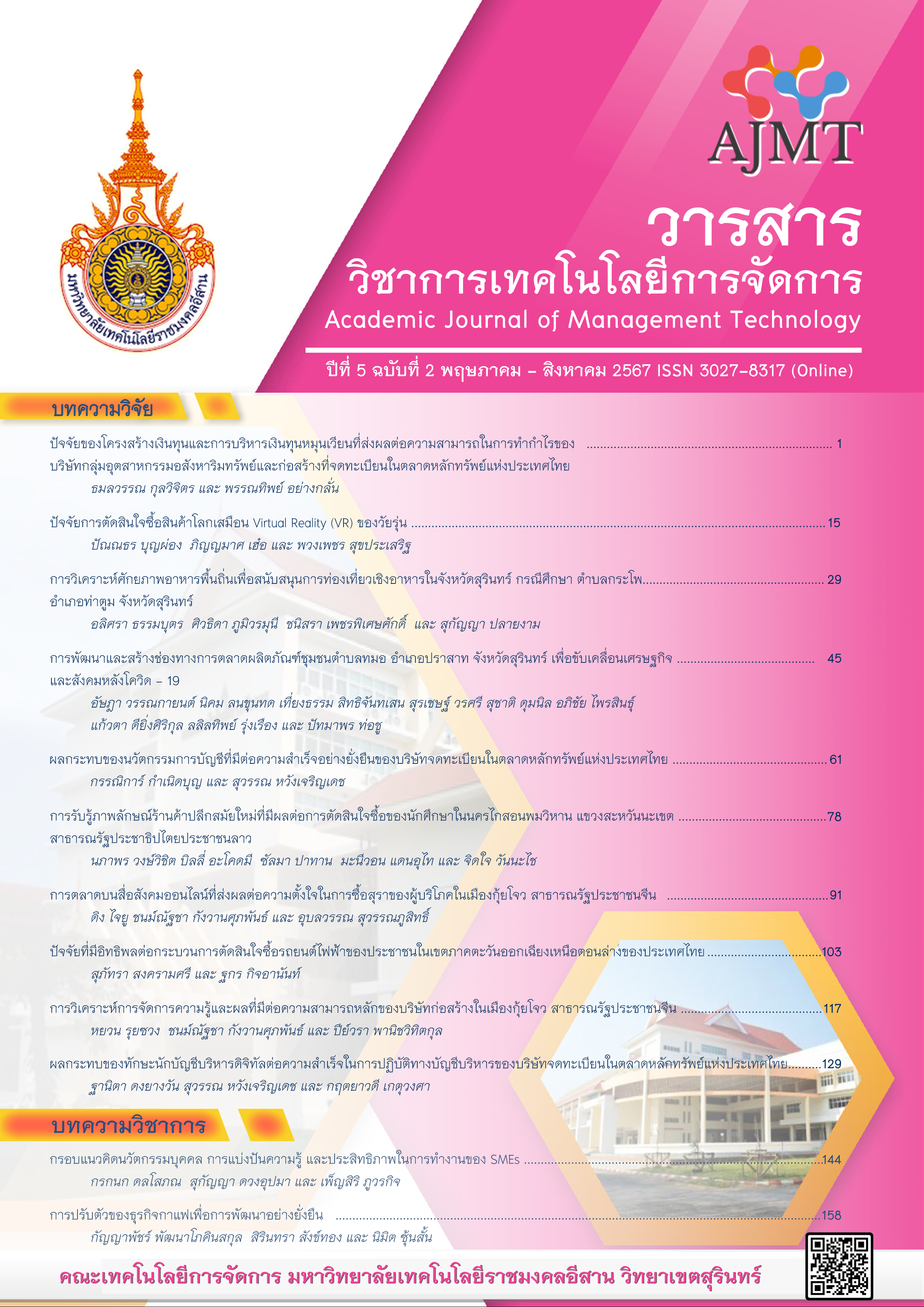ปัจจัยที่มีอิทธิพลต่อกระบวนการตัดสินใจซื้อรถยนต์ไฟฟ้าของประชาชนในเขตภาคตะวันออกเฉียงเหนือตอนล่างของประเทศไทย
DOI:
https://doi.org/10.14456/ajmt.2024.17คำสำคัญ:
กระบวนการตัดสินใจ, รถยนต์ไฟฟ้า, อีสานใต้ของประเทศไทยบทคัดย่อ
ภาคตะวันออกเฉียงเหนือตอนล่างของประเทศไทย ประกอบด้วย 5 จังหวัด ได้แก่ นครราชสีมา บุรีรัมย์ สุรินทร์ ศรีสะเกษ และอุบลราชธานี มียอดจดทะเบียนรถยนต์รวมทุกประเภท ณ สิ้นเดือนธันวาคม ปี พ.ศ. 2565 มากกว่า 247,447 คัน โดยเป็นรถไฟฟ้าและไฮบริด เพียง 2,397 คัน หรือคิดเป็นร้อยละ 0.97 ของรถยนต์ที่จดทะเบียนทั้งหมด ซึ่งกระบวนการตัดสินใจ ซื้อรถยนต์ไฟฟ้าขึ้นอยู่กับปัจจัยหลายเหตุผล การวิจัยครั้งนี้มีวัตถุประสงค์เพื่อ 1) ศึกษาอิทธิพลของส่วนประสม ทางการตลาด การยอมรับเทคโนโลยี การรับรู้คุณค่าตราสินค้า ที่มีต่อกระบวนการตัดสินใจซื้อรถยนต์ไฟฟ้าของประชาชนในเขตจังหวัดอีสานใต้ของประเทศไทย และ 2) ตรวจสอบความสอดคล้องแบบจำลองปัจจัยที่มีอิทธิพลต่อการตัดสินใจซื้อรถยนต์ไฟฟ้าของประชาชน ในเขตจังหวัดอีสานใต้ของประเทศไทยกับข้อมูลเชิงประจักษ์ กลุ่มตัวอย่าง คือ ประชาชนที่ตัดสินใจซื้อรถยนต์ไฟฟ้า จำนวน 380 คน ได้มาโดยวิธีการสุ่มแบบหลายขั้นตอน เก็บรวบรวมข้อมูลด้วยแบบสอบถามที่มีค่าความเชื่อมั่นทั้งฉบับเท่ากับ 0.968 ในช่วงเดือนกุมภาพันธ์ถึงเดือนมิถุนายน 2566 วิเคราะห์ข้อมูลด้วยโปรแกรมสำเร็จรูปทางสถิติโดยใช้เทคนิคการวิเคราะห์โมเดลสมการโครงสร้าง ผลการวิจัยพบว่า กระบวนการตัดสินใจ (DEC) ได้รับอิทธิพลสูงสุดจากการรับรู้คุณค่าตราสินค้า (BRA) มีค่าอิทธิพล 0.68 รองลงมาคือ ส่วนประสมทางการตลาด (MAR) มีค่าอิทธิพล 0.24 และการยอมรับเทคโนโลยี (TEC) มีค่าอิทธิพล 0.21 ซึ่งเป็นอิทธิพลทางตรงทั้งหมด ที่ระดับนัยสำคัญทางสถิติ 0.01 และแบบจำลองมีความสอดคล้องกลมกลืนกับข้อมูลเชิงประจักษ์ โดยค่าดัชนีชี้วัดความกลมกลืนผ่านเกณฑ์การยอมรับทุกค่า
เอกสารอ้างอิง
Abu-Alkeir, N. I., Area, S., & Jordan, A. (2020). Factors influencing consumers buying intentions towards electric
cars: The Arab customers’ perspective. International Journal of Marketing Studies, 12(2), 127.
Angsuchot, S., Vijitwanna, S., & Pinyopanuwat, R. (2011). Statistical analysis for social and behavioral science
research: Techniques for using the LISREL program (3rd ed.). Charoen Dee Mankong Publishing.
Central Office of Civil Registration, Department of Provincial Administration. (2019). Population data.
Housing Strategy and Information Division Housing Development Academic Department National Housing Authority.
Cui, L., Wang, Y., Chen, W., Wen, W., & Han, M. S. (2021). Predicting determinants of consumers’ purchase motivation for electric vehicles: An application of Maslow’s hierarchy of needs model. Energy Policy, 151, 112167.
Department of Transport. (2023). Transport statistics Group. https://web.dlt.go.th/statistics/
Economic Analysis Center TTB. (2023). Estimated 2023 sales of EV passenger cars. https://www.ttbbank.com/th/newsroom/detail/ttb-analytics-estimates-2023-ev-car-sales-grow-3-times
Edwards, W. (1954). The theory of decision making. Psychological Bulletin, 51(4), 380-417. https://doi.org/10.1037/h0053870
Green Network. (2563). Ministry of industry moving forward with the roadmap for developing the electric vehicle
industry. Set a goal to produce 30% of electric vehicles in 2030.https://www.greennetworkthailand.com/roadmap-electric vehicles/
Joreskog, K. G., & Sorbom, D. (1996). Lisrel 8: Structural equation modeling with the SIMPLIS command language.
Scientific Software International.
Kanchanarote, R. (2021). The causal and effect factors influencing business transformation and business performance of small and medium enterprises under the production sector in Thailand [Unpublished Doctoral dissertation]. Sripatum University.
Kiengprasit, P. (2021). The causal factors affecting supply chain management and business performance of small
and medium enterprises under the transport service sector in Thailand. [Unpublished Doctoral dissertation]. Sripatum University.
Kotler, P. (2003). Marketing Management (11th ed.). Prentice-Hall.
KV, S., Michael, L. K., Hungund, S. S., & Fernandes, M. (2022). Factors influencing adoption of electric vehicles-A case in India. Cogent Engineering, 9(1), 2085375.
McCarthy, J. (1960). Basic Marketing: A managerial approach. Irwin.
Ministry of Energy. (2019). Energy situation of Thailand. https://energy.go.th/en/home
Mutavdžija, M., Kovačić, M., & Buntak, K. (2022). Assessment of selected factors influencing the purchase of electric vehicles-A case study of the republic of Croatia. Energies, 15(16), 5987.
Neto, O. F. R. B. (2021). Motivações e constrangimentos dos condutores de carros elétricos em Portugal: Uma análise de usabilidade [Unpublished Doctoral dissertation]. Universidade de Lisboa (Portugal).
Nitsubgnoen, W. (2022). Development of a structural equation model of the factors affecting leadership technology of school administrators in the digital age group in secondary schools in the gulf coast of the southern province, under the authority of the office of the basic educational commission [Unpublished Doctoral dissertation]. Srinakharinwirot University.
Peer Power. (2022). 5 factors affecting the trend of electric cars (EV) and 5 investment opportunities.https://www.peerpower.co.th/
blog/investor/ev-and-investment/
Phutthiwarathikun, S. (2019). Factors affecting the decision to purchase Nissan Leaf electric vehicle of the consumers in Bangkok Metropolis [Unpublished Master’s independent study]. Thammasat University.
Rakam, E., Pattanarangsan, P., & Phongphitsanupichit, J. (2022). Factors affecting the decision to purchase electric
cars. In Kuanliang, A. 22nd National Graduate Studies Conference at Sripatum University Via a virtual teleconferencing system, (pp.1101-1108) https://econ.src.ku.ac.th/QA/files/2565/6334750411_Full.pdf
Rogers, E. M. & Shoemaker, F. F. (1971). Communication of Innovations; A Cross-Cultural Approach. ERIC Number: ED065999.
Semsaman, S., Wathanakom, N., & Ngamvichaikit, A. (2023). Factors influencing consumers’ decision topurchase bottled freshly squeezed vegetable and fruit juices in Bangkok. Academic Journal of ManagementTechnology, 4(2), 124-138.
Sharma, V., Jangir, K., Chowhan, S. S., & Pathak, N. (2023). Key factors influencing electric vehicle purchase decisions by consumers: an empirical study of Indian consumers. In Renewable Energy Optimization, Planning and Control: Proceedings of ICRTE 2022 (pp. 449-464). Singapore.
Thammasang, I. (2019). Factors affecting the decision to use electric cars. of the people in Chonburi Province (Research Report No. 6214060082). Ramkhamhaeng University.
Tokham, P., Tarichkul, W. & Anywatnapong, M. (2022). The influence of factors on purchasing decision process for battery electric vehicles of consumers in Bangkok Metropolis. Journal of Business Administration and Social Sciences Ramkhamhaeng University, 5(1), 53-72.
Vanichbuncha, K. (2014). Structural equation analysis (SEM) with AMOS (2nd ed.). Samlada Limited Partnership.
Vongkittiwat, P. (2021). The factors affecting electric Vehicle’ purchase decision of working age consumers in Bangkok [Unpublished Master’ s independent study]. Bangkok University.
Verma, M., Verma, A., & Khan, M. (2020). Factors influencing the adoption of electric vehicles in Bengaluru. Transportation in Developing Economies, 6(2) 1-10.
Wongsakda, P. (2020). Factors affecting purchase decisions for electric vehicle of working-aged people in Bangkok (Research Report No. 6314060156). Ramkhamhaeng University.
ดาวน์โหลด
เผยแพร่แล้ว
รูปแบบการอ้างอิง
ฉบับ
ประเภทบทความ
สัญญาอนุญาต
ลิขสิทธิ์ (c) 2024 คณะเทคโนโลยีการจัดการ มหาวิทยาลัยเทคโนโลยีราชมงคลอีสาน วิทยาเขตสุรินทร์

อนุญาตภายใต้เงื่อนไข Creative Commons Attribution-NonCommercial-NoDerivatives 4.0 International License.
บทความที่ได้รับการตีพิมพ์เป็นลิขสิทธิ์ของคณะเทคโนโลยีการจัดการ มหาวิทยาลัยเทคโนโลยีราชมงคลอีสาน วิทยาเขตสุรินทร์
ข้อความที่ปรากฏในบทความแต่ละเรื่องในวารสารวิชาการเล่มนี้ เป็นความคิดเห็นส่วนตัวของผู้เขียนแต่ละท่านไม่เกี่ยวข้องกับคณะเทคโนโลยีการจัดการ มหาวิทยาลัยเทคโนโลยีราชมงคลอีสาน วิทยาเขตสุรินทร์ และคณาจารย์ท่านอื่นๆในมหาวิทยาลัยฯ แต่อย่างใด ความรับผิดชอบองค์ประกอบทั้งหมดของบทความแต่ละเรื่องเป็นของผู้เขียนแต่ละท่าน หากมีความผิดพลาดใดๆ ผู้เขียนแต่ละท่านจะรับผิดชอบบทความของตนเองแต่ผู้เดียว










